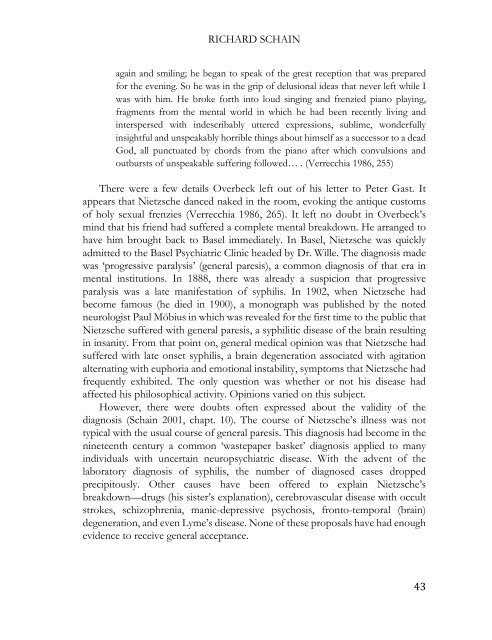Volume XII, Issue II, Spring 2019
You also want an ePaper? Increase the reach of your titles
YUMPU automatically turns print PDFs into web optimized ePapers that Google loves.
RICHARD SCHAIN<br />
again and smiling; he began to speak of the great reception that was prepared<br />
for the evening. So he was in the grip of delusional ideas that never left while I<br />
was with him. He broke forth into loud singing and frenzied piano playing,<br />
fragments from the mental world in which he had been recently living and<br />
interspersed with indescribably uttered expressions, sublime, wonderfully<br />
insightful and unspeakably horrible things about himself as a successor to a dead<br />
God, all punctuated by chords from the piano after which convulsions and<br />
outbursts of unspeakable suffering followed… . (Verrecchia 1986, 255)<br />
There were a few details Overbeck left out of his letter to Peter Gast. It<br />
appears that Nietzsche danced naked in the room, evoking the antique customs<br />
of holy sexual frenzies (Verrecchia 1986, 265). It left no doubt in Overbeck’s<br />
mind that his friend had suffered a complete mental breakdown. He arranged to<br />
have him brought back to Basel immediately. In Basel, Nietzsche was quickly<br />
admitted to the Basel Psychiatric Clinic headed by Dr. Wille. The diagnosis made<br />
was ‘progressive paralysis’ (general paresis), a common diagnosis of that era in<br />
mental institutions. In 1888, there was already a suspicion that progressive<br />
paralysis was a late manifestation of syphilis. In 1902, when Nietzsche had<br />
become famous (he died in 1900), a monograph was published by the noted<br />
neurologist Paul Möbius in which was revealed for the first time to the public that<br />
Nietzsche suffered with general paresis, a syphilitic disease of the brain resulting<br />
in insanity. From that point on, general medical opinion was that Nietzsche had<br />
suffered with late onset syphilis, a brain degeneration associated with agitation<br />
alternating with euphoria and emotional instability, symptoms that Nietzsche had<br />
frequently exhibited. The only question was whether or not his disease had<br />
affected his philosophical activity. Opinions varied on this subject.<br />
However, there were doubts often expressed about the validity of the<br />
diagnosis (Schain 2001, chapt. 10). The course of Nietzsche’s illness was not<br />
typical with the usual course of general paresis. This diagnosis had become in the<br />
nineteenth century a common ‘wastepaper basket’ diagnosis applied to many<br />
individuals with uncertain neuropsychiatric disease. With the advent of the<br />
laboratory diagnosis of syphilis, the number of diagnosed cases dropped<br />
precipitously. Other causes have been offered to explain Nietzsche’s<br />
breakdown—drugs (his sister’s explanation), cerebrovascular disease with occult<br />
strokes, schizophrenia, manic-depressive psychosis, fronto-temporal (brain)<br />
degeneration, and even Lyme’s disease. None of these proposals have had enough<br />
evidence to receive general acceptance.<br />
43









